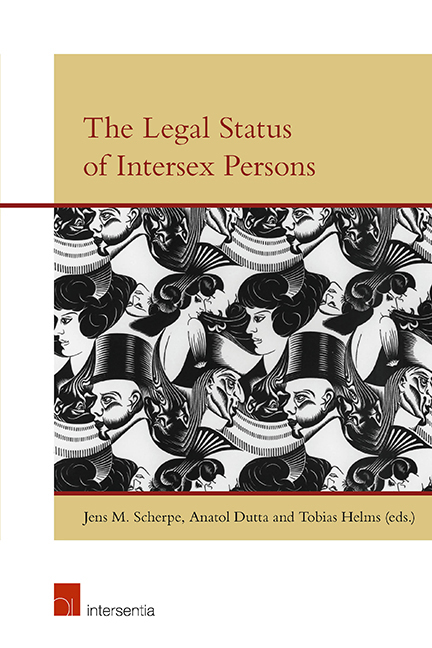Book contents
- Frontmatter
- Preface
- Contents
- List of Contributors
- The Legal Status of Intersex Persons: An Introduction
- Malta Declaration
- Darlington Statement
- Vienna Statement
- PART I MEDICINE AND PSYCHOLOGY
- PART II THEOLOGY AND LEGAL HISTORY
- Intersex in the Christian Tradition: Personhood and Embodiment
- Four Sexes, Two Genders: The Rabbinic Move from Legal to Essentialist Polarisation of Identities
- Intersex: Some (Legal-)Historical Background
- PART III TRANSGENDER, TRANSSEXUALITY AND INTERSEX
- PART IV NATIONAL LEGAL DEVELOPMENTS
- PART V PRIVATE INTERNATIONAL LAW ASPECTS OF INTERSEX
- PART VI INTERSEX AND HUMAN RIGHTS
Intersex in the Christian Tradition: Personhood and Embodiment
from PART II - THEOLOGY AND LEGAL HISTORY
Published online by Cambridge University Press: 31 January 2019
- Frontmatter
- Preface
- Contents
- List of Contributors
- The Legal Status of Intersex Persons: An Introduction
- Malta Declaration
- Darlington Statement
- Vienna Statement
- PART I MEDICINE AND PSYCHOLOGY
- PART II THEOLOGY AND LEGAL HISTORY
- Intersex in the Christian Tradition: Personhood and Embodiment
- Four Sexes, Two Genders: The Rabbinic Move from Legal to Essentialist Polarisation of Identities
- Intersex: Some (Legal-)Historical Background
- PART III TRANSGENDER, TRANSSEXUALITY AND INTERSEX
- PART IV NATIONAL LEGAL DEVELOPMENTS
- PART V PRIVATE INTERNATIONAL LAW ASPECTS OF INTERSEX
- PART VI INTERSEX AND HUMAN RIGHTS
Summary
INTRODUCTION
Like everyone else, individuals whose bodies are different from the majority of the population on account of variations in their sexed development seek to live a fulfilling life: to be happy; to experience good health and mental well-being; to have agency and the freedom to choose how they live their life; and to be treated justly, equitably within society and not be subjected to harm by others. Like everyone else, their well-being is caught up with their sense of self, identity and narrative, ‘their story’ and, this is shaped by language, by the ways in which they are recognised by others, by their actions in the world and the actions of the world upon them. Clearly people with variations in sex development are likely to have to negotiate particular challenges in making sense of their embodiment and in realising certain common human aspirations – including intimate relationships and parenthood. So, alongside the usual cast list of those who play a key role in the shared and fundamentally human task of making sense of the self – parents, siblings or friends – or the key institutional settings of socialisation (education, employment), contemporary individuals with variations in sex development are also very likely to be shaped by extensive experience of clinical medical settings.
This chapter seeks to set the experience of people with unusual sexed embodiment within the larger narrative of Christianity, the cornerstone of Western culture and thought, especially of its morality. The first substantial section will therefore consider theological and ethical reflections within early Christianity through a focus on two surprisingly pertinent passages within authoritative writings – The Gospel according to Matthew and Saint Augustine's City of God. It will be argued that in both, the authors challenge inherited cultural categories in ways that rehabilitate and promote the well-being of individuals with variations in sex development. this section is followed by a consideration of the contemporary situation. Here, particular attention is drawn to the dissensus that exists between the medical sphere that focuses on ‘disorders of sex development’ and the more identitarian orientation of some intersex activism and human rights advocacy.
- Type
- Chapter
- Information
- The Legal Status of Intersex Persons , pp. 105 - 164Publisher: IntersentiaPrint publication year: 2018
- 1
- Cited by



